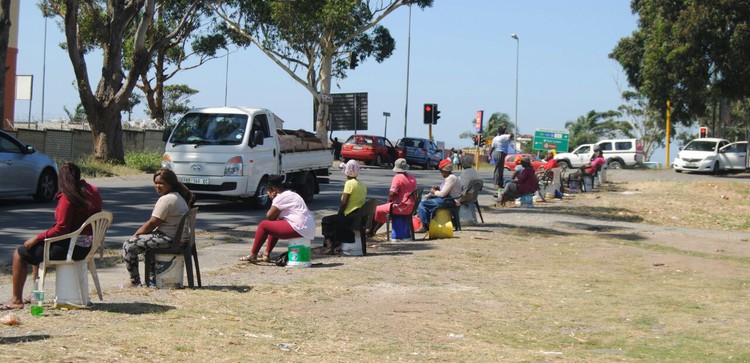Women wait for work on the side of the road
“We cannot give up because we have children that depend on us.”
In front of one of the biggest social housing developments in Amalinda, East London, women wait from as early as 6am, sitting on upturned buckets and crates, hoping they will be offered a job.
It is common to see men waiting on the side of the road, hoping for a bakkie to stop and offer them a construction job, but women are seldom seen doing this.
Many of the women we spoke to are single mothers. Most get offered jobs as domestic workers – cleaning houses or washing clothes. They charge according to what work they do but at most they will earn between R150 to R250 a day.
They described the difficulties they face, for example being picked up with a promise of a cleaning job, only to be asked for sex instead.
Vuyelwa Mahlathi, from Braelyn, is a single mother of two children. She has been coming to this spot for three years. She is luckier than most of the other women, since she has a permanent job two days a week. But she stands at this spot four days a week trying to get more work.
She says sometimes people refuse to pay the amount of money asked for. “Someone comes and tells you they have washing that they want you to do. You tell them your price. You get there and they want you you to clean the house as well but refuse to add money.”
“Some would even give you less than what you asked for but because you need it, you will take,” says Mahlathi.
Thirty-two year old Zandile Mbambo doesn’t join the rest of the people sitting in a line. She sits alone next to some bushes that give her some protection from the sun. She stays in Duncan Village and it takes her 30 minutes to walk from her home to Amalinda.
Her husband used to work as a construction worker but has been unemployed for two years after he fell ill. He looks after their two-year-old child at home when she goes job hunting.
On days when she does not get any work she leaves at 4pm to make the 30 minute journey home to get home in time to make supper. “It’s hard sometimes. You can wait for months without getting a job and the people at home are expecting you to come home with something,” says Mbambo.
Nomnikelo Ngwangqa sells fruit and vegetables to the women as well as to the people who live in the nearby flats. “I don’t get a lot of customers because the other shops are close by and people would rather just go straight to the shops. I only get those that do not feel like to walking,” says Ngwangqa.
Ngwangqa, who has a six year old daughter, dropped out of college before she could finish her marketing course due to financial reasons. “I do not make much money here, maybe R500 a month, that is why I still do the jobs if a car comes and I get to it first.”
If she gets a job, she leaves her stand to be run by one of her friends. After she is done work she comes back to her stand to pack her things to get ready to go home. “Raining or not we are here. We cannot give up because we have children that depend on us. The little we get is better than nothing.”
© 2018 GroundUp. 
This article is licensed under a Creative Commons Attribution-NoDerivatives 4.0 International License.
You may republish this article, so long as you credit the authors and GroundUp, and do not change the text. Please include a link back to the original article.



